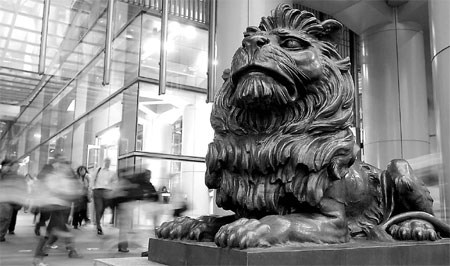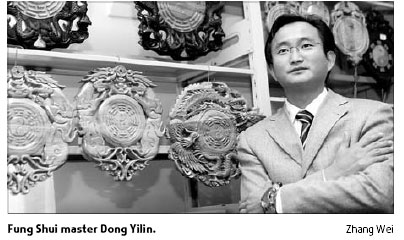Position of power
 |
|
From a feng shui point of view, the bronze lion statues in front of the HSBC Main Building are believed to contribute to the steady revenue of the bank. Deng Yong'an |
Dong Yilin, a Beijing-based feng shui master, quickly identified a problem in his house, finding fault with the positioning of the bedroom after determining its direction with a compass.
According to Dong, the bedroom was in a gu xing position, a specialist term representing isolated relations with the outside world.
"It can have a negative impact on your emotions, your relationship with your partner, as well as other relationships. Of course this will affect your business practice," Dong explained to Gao.

Dong suggested he moved his bedroom to the guest room, which is located in a position of wealth. This meant, however, that Gao would have to give up his original bedroom, which had ample sunshine and a big balcony.
Gao used to be skeptical about feng shui, but said he now saw it as another tool to help his business grow. He said he would be paying attention to the feng shui master's advice.
"At least it makes me feel mentally better," he said.
Previously deemed superstitious and banned after 1949, feng shui practice is quietly making a comeback, especially among business people and real estate developers.
Shi Aidong, a folk customs scholar with the Chinese Academy of Social Sciences, says feng shui deals with environmental aesthetics and this is an important part of traditional Chinese culture.
"It is not that more people are believing in feng shui, rather they are adopting a more open attitude toward it and give it a wider space for growth," Shi says.
"To obtain good feng shui advice, people must pay more money. More people concerned about feng shui showes that living standards have improved."
People with more career uncertainties, such as businessmen, tend to believe in feng shui more, Shi adds.
Dong says most of his clients are in their 30s and 40s and are affluent. He charges according to the size of the house, around 80 yuan ($10.80) per sq m.
Clearly, feng shui is already a selling point for many modern real estate projects and feng shui masters are increasingly involved in the design of commercial buildings.
Dong says a Beijing developer recently invited him to improve the design of his buildings and as a result 175 apartments were sold within six months. The price of the apartments soared from the original 3 million yuan ($405,000) to more than 10 million yuan ($1.35 million), Dong says.
Opening an interior decoration and design company incorporating feng shui elements is his next business venture.
Dong is always busy. Besides meeting clients, he also lectures on feng shui. So far this year he has already given more than 100 lectures around the country.
Real estate developers usually invite him to lecture and Dong is paid around 10,000 yuan ($1,350) per hour.
Additionally, Dong gives some free public lectures. He is well aware that public attention can promote his business. He is the host of 66 online feng shui forums.
With the aid of online media, Dong's profile is growing. The public perception of him, however, is that he is older than his 32 years, as the stereotypical feng shui master is gray-haired and wears a gown, or traditional Chinese clothes.
"Young people are not trusted in this business. When I first met my clients years ago, it was common for them to show a contemptuous attitude," Dong says.
Dong became a feng shui master after studying The Book of Changes, upon which feng shui is based. It was a family tradition to learn the book and as a child his father asked him to recite The Book of Changes, like children's songs.
In 1994, he accompanied his father to Beijing from their hometown in East China's Shandong Province. His father soon established a reputation in feng shui circles.
The younger Dong quickly made an impression in the business and started to give feng shui lectures in 1996. In 2001, he set up a consultancy business and has become a rising star.
"My father is not so happy with this. He hopes that I am not too successful. In his opinion, a feng shui master should always maintain a low key," he says.
Dong's father still practices in the time-honored fashion - staying at home and receiving clients through introduction. His son, however, believes integrating modern, commercial business practices makes feng shui more vigorous.
The literal meaning of feng shui is wind and water, and practitioners claim that it studies the harmonious co-existence between humans and the environment.
Dong cites an example to explain this relation. The saying "backed by mountain, facing water" is generally called good feng shui.
"It is quite reasonable. If a mountain is behind us, we feel safe, as people, animals or wind cannot come up behind us. Facing water, we feel comfortable, as water is clean and purifies the air," he says.
Dong says he does not believe feng shui is a science or a spiritual practice. "It should fall into the category of traditional Chinese philosophy and culture. It is not mysterious, rather it is based on calculations."
Dong warns that cheating is common in the feng shui business world.
"Only one in 1,000 practitioners have registered companies and play fair and square. A large majority still make their rounds of the streets or alleys to find clients," he says.
Their tricks are simple but effective, he warns. When they meet a middle-aged woman they say there will be a marriage crisis. If they meet a middle-aged man they say there are feng shui problems that are affecting their career.
"Some of them make use of common psychology. Most women feel uncertain about their marriage, while most men are not satisfied with their achievements," Dong explains.
A good feng shui practitioner must be righteous and not greedy, Dong says.
(China Daily 11/23/2007 page20)














